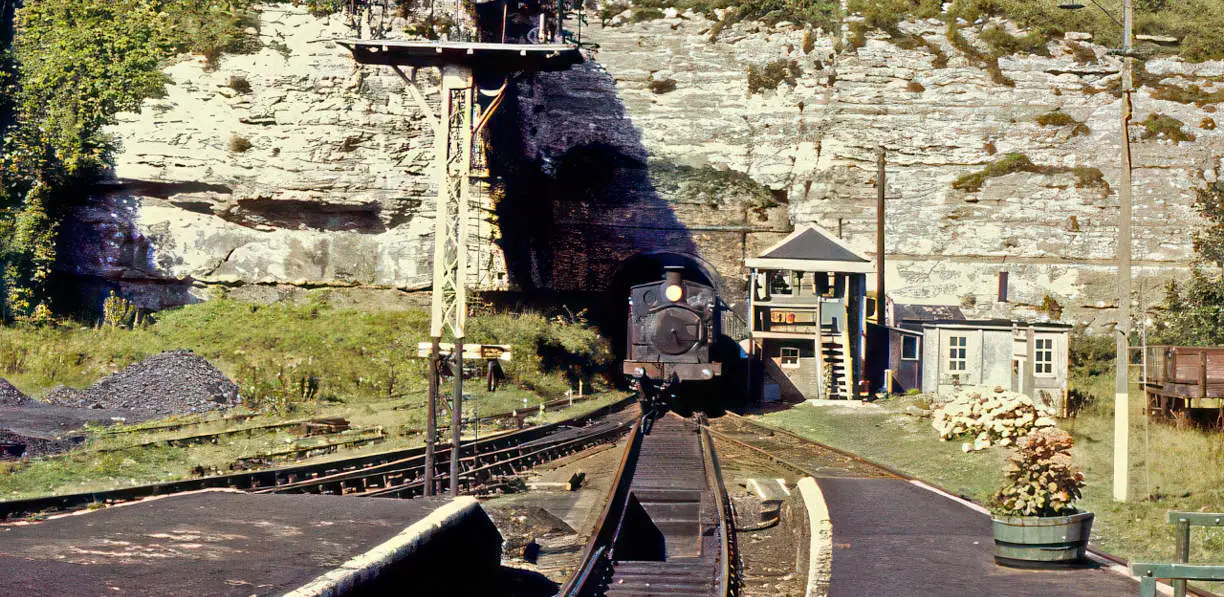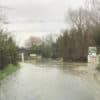David Baldwin MVO, RVM, Ventnor Resident and 2016 Gilbert Lecturer and Fellow, Princeton University shares his informed view on what might (or should) be next for Ventnor following the Bonchurch Landslip.
In his own words. Ed
In 2021, over two years ago, the Government sought (with support from County Councils and MPs being a condition) applications for restoration of branch railway lines.
Our Isle of Wight council and MP accordingly submitted a bid to have the railway restored from Shanklin to Ventnor, employing once again the tunnel that remains extant and in good order for this purpose, shared as it is inside with the Southern Water utility pipe along the eastern wall. The IWC appointed ‘The Centre for Economics and Business Research‘ in London as the Consultants for the bid.
Economic decline
A Government / Department for Transport condition of the application was that every bid had to have an official from HM Treasury appointed to it.
The bid also evolved into a proposal to reconnect Newport with Ryde by avoiding the surviving heritage steam railway route via Havenstreet and instead reinstating the old Sandown-Newport branch.
However, despite the best efforts of the Consultants this had the effect of relegating the reinstatement of the Shanklin to Ventnor bid somehow into a lesser ‘also-ran’ proposal in the bid.
Compiled and submitted a brief
Concerned that it was being forgotten as the bid unfolded, I compiled and submitted to the chosen Consultants a brief entitled “Ventnor’s economic decline as a result of railway closure and its restoration as a solution“.
It was a major paper full of statistical and geological analyses, ending thus:
“In summation, without reconnecting Ventnor to the national railway system by restoring the railway between Ventnor and Shanklin via Wroxall, Ventnor’s half-century socio-economic decline will drive the consequential exponential rise in costs to the Exchequer to the point when that becomes irreversible.
“In short, there is a choice to be made that cannot wait. Either the Exchequer will have to bear ever-increasing costs that already dwarf the cost of restoring the railway to the town, or else restore the railway with the prospect of that action reducing the burden to the Exchequer over time.
“To the annual costs to the Exchequer must be added the very significant geological costs particular to Ventnor that will inevitably fall to the Exchequer if it is decided to adopt the ‘Canute’ approach in attempting to maintain sustainable road access to and from Ventnor. The economically numerate alternative is to adapt to the regular geological incursions by restoring a sound and geologically stable route in and out of Ventnor. This will temper the effects of Ventnor’s frequent landslips, retaining commercial and public confidence in the town rather than sapping its ability to survive and piling Exchequer resources into unstable geology with the certain consequence that the ground will fail again at any time”.
Decision made in spite of information
Of the greatest importance was the presence of a Treasury official appended to the unfolding bid, reading my brief, the Treasury will thus have known the inevitable, dire exponential financial consequence to the public purse of ignoring the inevitable geological deterioration facing the town of Ventnor
Those who made the decision to reject the railway restoration bid must have done so in the face of the information, one assumes they must have been aware of by consulting the essential and highly informative detailed charts of the British Geological Survey of Ventnor and its environs.
The tunnel
The Victorian engineers who built the tunnel into Ventnor Town from Wroxall knew exactly what they were doing between 1864-66, routing it through high-density chalk and onto the end of that ledge into the old quarry which they used to house the terminus and sidings.
It was that same stable quality high-density chalk that a hundred years later was identified at the Needles to bear the stresses born of the rocket testing station there.
Curse of the blue slipper
Either side and below the old station the geology of Ventnor is much less stable, clays and blue slipper intruding as strata into the chalk here and there, with all the inevitable consequence of landslip and subsidence.
Victorian and Edwardian structural engineers chose wisely where to locate buildings through Ventnor, mindful of the many sub-aquifers. A wake-up call to this came on 12th July 2021 when it became clear that imminent danger-spots were at Smugglers Haven and the Lowtherville Graben, catastrophic landslip having already occurred along the Undercliff beyond St Lawrence, closing that A road ever since.
I sent anxieties about road stability in the Ventnor area into the railway bid Consultants in 2021 before the decision to reject it was taken.
The following images from December in Ventnor show the fragility of the present public transport infrastructure.
All this chaos has been occasioned by Island Roads closing just a fifteen foot section across Alpine Road lower in the town.
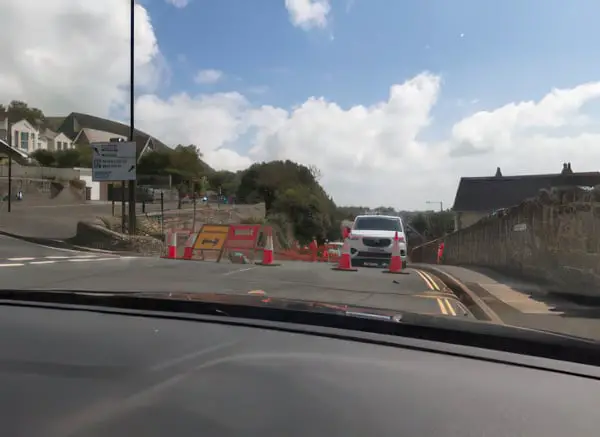
Diversion up Ocean View Road
Whilst Newport Road was closed in December, it meant there were only two roads out of Ventnor leading Westward. This closure led to the only diversion that could be made – ie via Ocean View Road. This can take only one lane of traffic as cars are parked all along it, so passing becomes impossible unless there is a break between parked cars.
The result was absolute and immediate chaos. The traffic backed into the town and the buses and taxis were unable to move. I was caught in it and witnessed a bus wedged tight against a lorry the occupants missing hospital and dental appointments and others unable to meet their care obligations and rostering. It took half an hour to un-wedge them. Businesses were complaining about lack of trade and deliveries and pupils were late for school.
Indisputable need for restoration of rail service
The irony is that old Ventnor Station faced onto this very blockage along Ocean View Road.
The need for the restoration of Ventnor Station to maintain basic and consistent public transport for the town, and soon, is now indisputable as result of the experience of these past two days.
The same chaos resumed later in the month, only this time the queues were right along Ocean View Road and down Gills Cliff Road, as well as back up to Wroxall at the junction.
11-mile round trip
Queues formed at all roads leading onto Ocean View Road from below as they were unable to join the existing queues already there along the road… I was unable to drive Eastward from the Park back to the town centre as the traffic was all diverted upwards to Ocean View Road and every turn was blocked.
I had no option but to exit Westwards towards St Lawrence and motor to Whitwell, Godshill and Shanklin in order to enter Ventnor from the East to get to my road. This was an eleven mile round trip to get back to where I started in Ventnor!
Geology waiteth for no man
So, it has come to this. Geology waiteth for no man and there has been a flurry of core sample drilling at the vulnerable locations along these vital routes too.
Below shows my pictures of these occurring during December along the A3065 at Smugglers Haven, where Leeson Road ends at Upper Bonchurch to the East of Ventnor.
If this section of the road collapses then there is no way Eastward to Shanklin at all from Ventnor.
Ocean View Road
The other drilling apparatus shows core sampling being extracted on Ocean View Road just around the bend from old Ventnor Station where they cut all the trees down a few months ago.
If this collapses then all traffic coming into town from the North via Wroxall or the West from Whitwell would have to negotiate the hair pin bends of the Zig Zag Road or Lower Gills Cliff Road. Both would soon be impassable to buses given the volume of traffic.
The glimpse into the future chaos to which Ventnor, in my view, will be subjected very soon, and the total breakdown of the public transport system without the benefit of the restoration of the railway to the town from Shanklin and Wroxall that has already taken place, is fully justified by this current experience.
Core drilling rig on Westbound carriageway of the A3065 at Smugglers Haven, 23rd June 2021
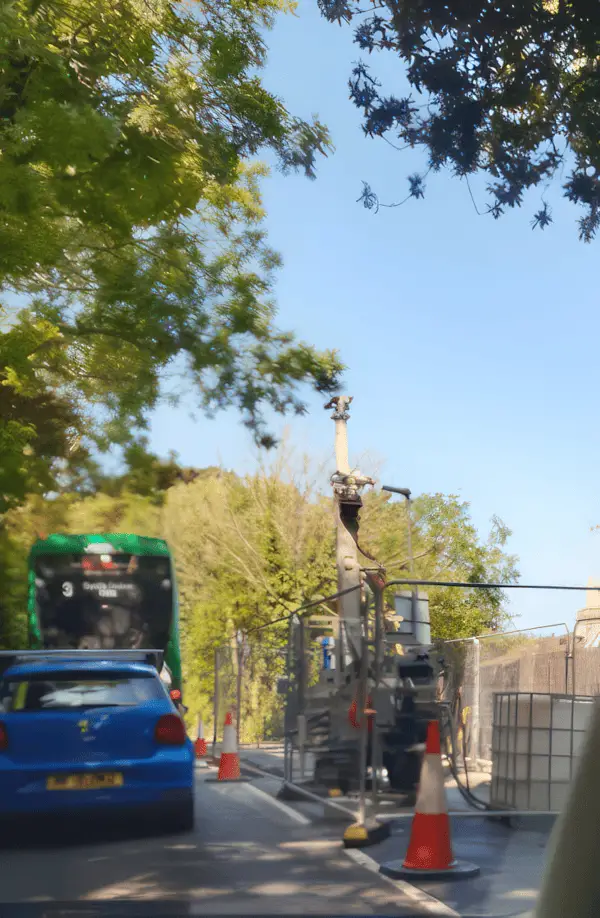
Core drilling rig on Westbound carriageway of the A3065 on Ocean View Road up from old Ventnor Station, 12th July 2021
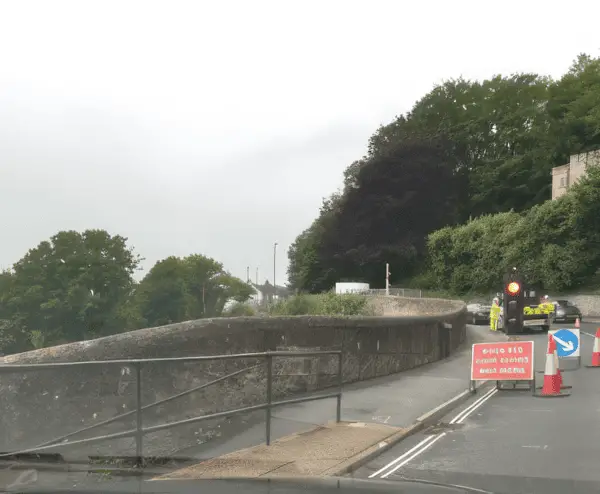
Folly of ignoring geology
In conclusion, the decision of central Government to reject the Ventnor railway restoration bid in 2021 was taken in full realisation of the inevitable cumulative year-on-year financial consequence to the town of so doing.
It is therefore incumbent upon the same authorities to admit the folly of ignoring geology in their decision and to make immediate restitution by rebuilding the railway back to Ventnor – not least for the sake of the public purse!
Miniscule cost
The cost of such a re-instatement is minuscule in relation to other concomitant bids elsewhere in the UK that were successful. If not we shall be back to something like when as a child I remember Ventnor being entirely cut off in 1962 for days over Christmas with snow and Red Funnel steamers, ‘Vecta’ and ‘Balmoral’ coming to the rescue by offloading supplies at the Pier Head for the town !
Postscript
It was with an air of resignation that I learned two days after writing the above of Cornwall County Council’s initiative in formally accepting the offer of a £50m grant from the ‘Department of Levelling-Up, Housing and Communities‘ to improve rail links through central Cornwall with Network Rail and GWR as partners. It is to begin next year.
This was achieved outside the Department for Transport’s 2021 ‘Restoring Your Branch Line‘ competition in which the Isle of Wight’s bid to restore the railway from Shanklin to Ventnor fell at the second stage. But Cornwall shows what can be done by a determined and inventive County Council.
A representative from HM Treasury was appended to the IW’s (and all other Branch Line) bids in 2021 and was appraised in detail of the British Geological Survey and other analyses of the inexorable geological deterioration Ventnor has to face (through a brief I was minded to compile and send to the appointed Consultants ) and the need to work as a matter of urgency with the extant railway tunnel closed 1966, but bored between 1865-6 through stable high-density chalk.
Ensuring economic and social future
This would ensure the economic and social future of Ventnor and Lowtherville with its 6,000 occupants and Wroxall with its 1,800 population.
It is surely now incumbent upon the Treasury to admit the consequence of overseeing the bid’s failure in 2022 in the full knowledge of the now eye-watering exponential consequences for the public purse in leaving a town to the fate of Chalk Marl, Upper Greensand, Chert, Firestone, Limestone, Freestone and argillaceous beds of Gault clay, resting as they do upon the Lower Greensand and Ferruginous sandstone – rather than adopting infrastructure that would re-occupy the stable high-density Chalk of St Boniface Down at Ventnor (similar geologically to the high-density chalk that that was able to house the Rocket Testing station vibrations at the Needles outcrop) which housed the railway and station terminus so successfully for a century along with two enormous internal water reservoirs and a Nuclear Bunker beneath the Chain Low Wartime Radar Station atop the Down.
Vital next steps
There is still a practical way forward, though. The IW Council should now approach the ‘UK Infrastructure Bank‘ (which is itself an arm of the Treasury) and was created by the present Prime Minister when Chancellor of the Exchequer.
It exists precisely for this kind of very purpose and contains economists already familiar with the plight of Ventnor and its environs but which, inexplicably, has not been approached. Now is surely the time, for the Isle of Wight to do so and insist upon urgent restoration of just four miles 16 chains section of railway at a quarter of the cost of the £50m Government grant just issued to Cornwall County Council to reconnect their isolated communities.

